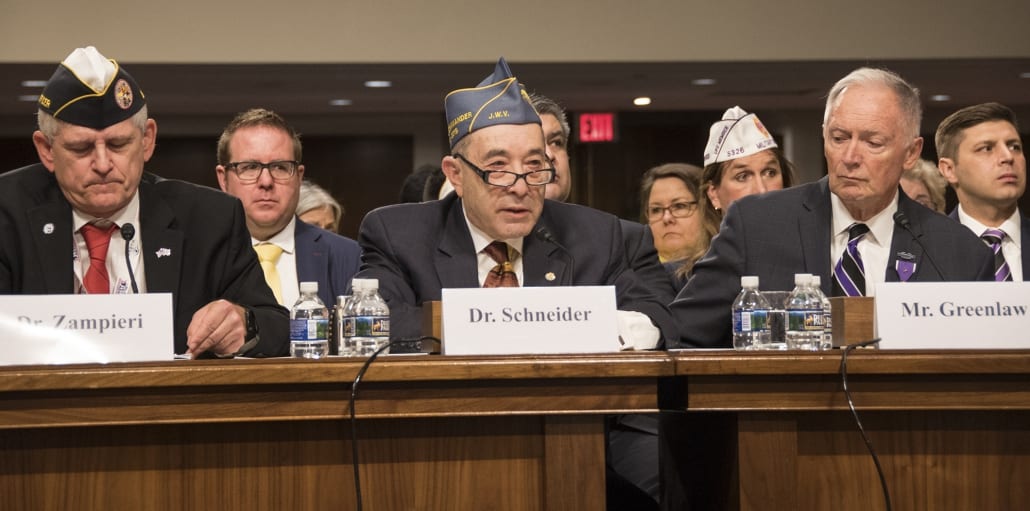By Dr. Marsha Schjolberg, CAPT, MSC, USN (Retired)
In the last issue of The Jewish Veteran, it was reported that suicide prevention and homelessness among veterans are the top two issues that the VA is focused on eliminating. Clearly, these issues are interrelated. We all know that despair and a sense of emptiness hastens the loss of life.
Despite the current climate of economic growth, homelessness among veterans continues to be a growing phenomenon. Although veteran disfranchisement, which plays out as “homelessness” effects every state, the sunbelt states have the largest populations of homeless veterans. It’s hard to be homeless in the winter in North Dakota; not so much on the beaches of Southern California, Florida, and the warm dry climate of Arizona.
As an example, California, which currently represents less than 4% of all enlistees, hosts 24% of all homeless veterans in the United States! According to numerous government studies previously submitted to JWV, 99% of all homeless veterans are enlisted and have served only one enlistment before separating from the service. 98% of all homeless veterans in California are NOT from California. Moreover, the face of the homeless veteran has changed. No longer are we seeing large numbers of Vietnam veterans, but rather young men and a growing number of women with children are sleeping on the streets.
Veterans’ organizations have stepped up to develop post enlistment training centers and homeless shelters. The military has stepped up and enhanced its Transitional Assistance Program (TAP) which helps military forces transition to civilian jobs, and the GI Bill has been enhanced to support both academic universities and technical training programs. Yet the problem grows. Government and support agencies have developed food banks, housing units, training programs as well as psychosocial services, but these agencies often feel like they are swimming against the tide. Why?
An “all volunteer” force attracts a cross section of people. Patriotism with the desire to serve has always been the overriding reason to join the service, but many also join to improve their personal circumstances by leaving undesirable environments and unpleasant family circumstances. The military becomes the new “family.” Once the enlistment ends, the “new family” breaks up. Then what?
As a career Medical Service Corps officer of 28 years with a background in public health, and a doctorate in at risk education/ educational leadership, the issues seems clear. Disenfranchisement is the big nut. In the military each person is part of a team, a family, with a specifically defined role and set of expectations. We are “all in this together.” As a civilian, that same level of support often does not exist.
Moreover, homelessness not only affects that individual veteran and his/her family, but has a major impact on the VA medical system and the veterans living in the area. VAMC’s in sunbelt states are often overwhelmed with long waits to access care, where other states with fewer veterans are not as severely impacted and may have services that are underutilized.
For 25 years I have been volunteering at STAND DOWN, which is part of a national movement to help homeless veterans. Each year, several thousand homeless veterans and their families (kids under 16) gather in cities up and down the coast of California as well as other states.
Veterans spend four days living in a tent city being assisted by physicians, dentists, psychologists, clergy, counselors, and veterans court services. Additionally, they are able to obtain new clothes, job counseling, hair cuts, showers, food, housing information, VA benefit information and even the opportunity to obtain a “free ticket” back home. Last year, I befriended a homeless veteran and his teenage girls at STAND DOWN. He was a former Marine. We talked for a long time. He was part of the unit who brought down Manuel Noriega. He left the service in the 90’s and has been homeless ever since. He thought he could “make it” in San Diego but had no skills beyond being an infantryman and just couldn’t get it together. “Suddenly, I had no one to tell me what to do,” he said. I asked him if he wanted free plane tickets for his family so that he could go home to Kansas City. He declined. He told his parents and friends back home that he was successful and felt that he couldn’t go home a failure. Sadly, his story is not unique. In fact, it is all too common.
However, distance and time change people. We mature and grow. The importance of psycho/social network cannot be overstated. The veteran has a network of high school friends and family to help guide them, provide them with a couch if necessary, and the local veterans groups would be welcoming. Familiarity and a sense of belonging is paramount. It’s a win- win.
So what to do? In 2017, Jewish War Veterans of the United States passed a resolution that would require one time enlistees to be discharged at their place of entry unless they had unique circumstances that would demonstrate a need to stay in their current state. Those circumstances included being married to a working spouse, being accepted to college or trade school in the area, having a post enlistment job offer, or having a medical condition that could only be handled locally. What have we done with that resolution? To my knowledge, nothing!
Fellow veterans, talk is cheap. Let’s be bold and mindful of the end game: the elimination of suicide and homelessness among our fellow veterans. And let’s move forward with our resolution.
Volume 73. Number 2. 2019


